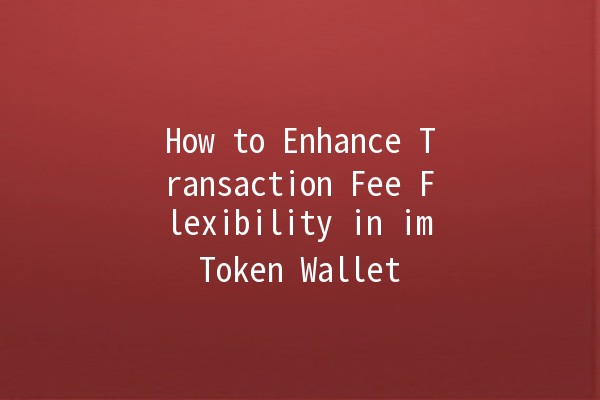imToken is a prominent cryptocurrency wallet that supports various digital assets and provides users with a seamless way to manage their tokens. In the world of cryptocurrency trading, transaction fees can significantly impact profits, especially during periods of high network congestion. Therefore, enhancing the flexibility of transaction fees can offer substantial benefits to users looking to optimize their trading strategies.
This article aims to provide practical tips and techniques on how to increase transaction fee flexibility within the imToken wallet, allowing users to control their costs better while improving transaction speed.
Transaction fees are payments made by users to network validators or miners for processing and confirming transactions. In highdemand networks like Ethereum, these fees fluctuate based on network traffic and complexity. Users must find a balance between speed and cost; higher fees usually result in faster transaction confirmations.

Here are five specific strategies that can help users increase transaction fee flexibility in their imToken wallets:
Explanation: Most blockchains, including Ethereum, use dynamic fee structures where the amount users pay can vary based on network conditions.
Application Example: Users can monitor realtime fee estimators available on platforms like EthGasStation or imToken’s builtin fee estimation tool. By understanding the current average fees, users can set their fees slightly above the average during lowtraffic times, ensuring transactions are processed without excessive costs.
Explanation: Transacting during offpeak hours can lower fees significantly since network congestion is less likely.
Application Example: By performing transactions late at night or during weekends, users can reduce costs. Monitoring network traffic patterns can help identify these offpeak times. Tools like blockchain explorers can indicate transaction volumes at various times, guiding users on ideal trading times.
Explanation: imToken provides the option to set custom fees rather than accepting default recommendations.
Application Example: Users can navigate to the transaction settings in the imToken wallet and input their desired fee based on current market conditions. For instance, if the recommended fee is 20 gwei, a user can opt for 15 gwei during low demand to save money, understanding this might result in slower confirmation times.
Explanation: Various Ethereum Improvement Proposals aim to optimize transaction fees and processing times.
Application Example: The implementation of EIP1559 introduced a base fee mechanism, which automatically adjusts transaction fees based on network congestion. ImToken users can take advantage of this by understanding how the EIP1559 fee model works. When utilizing EIP1559, they can set their priority fee, giving them control over transaction speed while ensuring they do not overpay.
Explanation: Regularly updated wallet software often includes the latest features, bug fixes, and optimizations related to fee calculations.
Application Example: Ensuring that the imToken wallet app is always uptodate can provide users with more accurate fee estimations and new features that improve transaction fee management. Users should enable automatic updates or regularly check for updates in app settings.
Transaction fees are influenced by network congestion, the complexity of transactions, and the overall demand for transaction processing. Higher demand typically leads to increased fees, while offpeak times can reduce costs.
Yes, users have the option to customize transaction fees in imToken. By accessing the transaction settings, users can set their preferred fee amount based on their urgency and financial goals.
EIP1559 introduces a dynamic fee structure that automatically adjusts base fees based on current network usage. Users can set a priority fee to ensure their transactions are confirmed quickly without overpaying.
Users can monitor current Ethereum gas prices on platforms like EthGasStation, GasNow, and imToken's integrated tools. This information helps users decide the best time to execute a transaction while keeping costs down.
If a transaction fee is set too low, the transaction may be delayed or remain unconfirmed, especially during congested times. Users risk their transactions being dropped from the mempool.
To minimize transaction fees, users should consider transacting during offpeak hours, setting custom fees based on realtime data, and keeping their wallet software updated to utilize the latest fee management features.
Enhancing transaction fee flexibility in the imToken wallet is a vital aspect of cryptocurrency management. By understanding and applying the techniques outlined above, users can effectively control their transaction costs, optimize speed, and ultimately improve their trading experiences. It’s essential for users to continually educate themselves on the latest developments in cryptocurrency and remain proactive in managing their fee strategies.